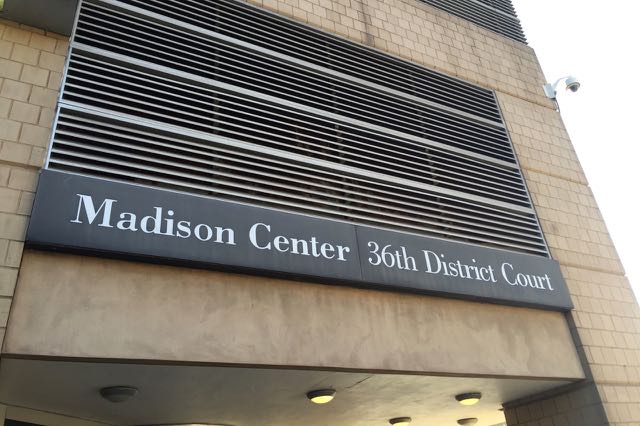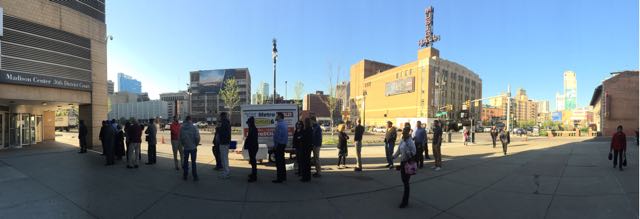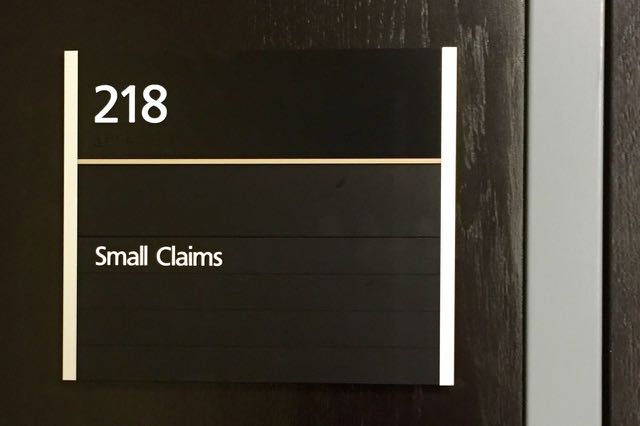Small Claims: A slow journey to justice in the 36th District Court
Working a case through small claims court can be can be a terrible burden. Michele Oberholtzer describes her path to "justice" at the 36th District Court, and explains why she was one of the lucky ones.

In the early morning light, a line of people slowly builds at the front doors of the 36th District Court. A bail bondsman in parachute pants stands patiently beside the line, waiting for the grinding gears of justice inside the building to churn out some clients for him.
The 36th District Courthouse is near the hub of Gratiot’s spoke, in an area that hosts an unlikely mix of functions: large-scale entertainment and criminal justice. Comerica Park and Ford Field are blocks away, and so is the unfinished jail, which is the possible site of a possible arena for a possible MLS team. The court itself is the subject of rumors about being turned into a hotel. Perfect. The sports-and-justice district brings an interesting variety of people here at different times of week and day. Sprinkled throughout are parking lots and hotdog vendors that are surprisingly well suited to both client bases.
I’ve come for a hearing in the Small Claims court with hopes of recovering my security deposit from a former landlord. Small Claims is “beginner’s court,” where parties forgo the use of a lawyer or the possibility of a large settlement for a hypothetically expedited process. I’m not a litigious person and have no desire to be here, but I want to stand up for myself. My former landlord—who resembles Vincent Van Gogh in both appearance and (I think) temperament—forced the issue, so here I am.
Technically, the entire building is considered “the courtroom,” so everyone who enters has to pass court-level security regardless of whether they’re on trial, filing a form or asking a question. Prohibited items include camera phones, beverages, and weapons: including firearms, knives, and skirts more than two inches above the knee.
A snack stand just outside the court’s front doors offers bananas, muffins, and informal locker services for novices who didn’t know that their cell phone chargers are considered strangulation devices or that their e-cigarettes would set off the security screening. After being turned away several times, I put my charger under an orange construction barrel, hidden in plain sight in the middle of Madison Avenue. I watch the people standing in line as they’re relieved of their valuables before they enter; it feels like a bad omen for what will go on inside.

Once inside, I’m drawn to a panel of monitors near the escalators with blinking lists of names on bright blue screens. They’re a lot like the departure and arrival screens in an airport, except no one here is going anywhere fast. I see my name and feel my nerves rise, but my agitation is premature. There’s just another set of closed doors and more waiting.
My hearing is scheduled for 8:00 a.m., which also happens to be the time the front doors open. I was worried about being late until realizing it’s physically impossible for anyone to be on time.

By the time courtroom doors open, it’s 8:25. By the time the magistrate arrives, it’s 8:45. The court officer says “you’re late!” and laughs. Papers are shuffled till 9:00. 9:05. 9:10.
Invisible threads of untold tensions crisscross the room as we all sit upright in our pews contemplating the sins of our adversaries. Sometimes the opponents know each other, but it appears that most of us are either being stood up or facing an anonymous representative of a bank, creditor or professional lever-puller. With nowhere to land, the anxiety spills out directionless and diffuse.
And yet, the languid pace and dull setting have a way of curbing the emotional charge. I am placated by the white noise of a copy machine humming in the background. The incredible lack of urgency is almost peaceful.
Suddenly, we’re “live.” The court officer addresses the poised crowd in a blur of words that I can’t begin to untangle. I watch her mouth to try to decipher the disclaimer she’s reciting but all I can make out is “noTalkingReadingorSleeping” and then, clearly, “be seated.”
I am hoping to be seen first because my issue seems so simple, but there are another dozen cases scheduled for 8:00 and it simply isn’t my turn. In the course of an hour or two, we pass through two mediations, two adjournments, and two default judgments.
I have to use the bathroom but fear I’ll be absent for the one instant that my name is called, so I sit with my legs crossed.
I play out the “trial” in my mind to pass the time, going over details of the disagreement between my former landlord and I. Beside me sits a folder filled with transcripts of email and text conversations, receipts and photos. It’s a lot of work for something so trivial. I’m brimming with the potential energy of an argument I never wanted to have.
Around 11:00, the magistrate sighs and looks out over the room: “I’m bored. Who else is bored?”
I tentatively raise my hand.
“Well, since everyone else seems to be having fun, you can go next.”
I can’t believe how little I get to say. There is no soliloquy or Exhibit A—not even validation that I’m in the right. I don’t get to choose how much mud to sling or withhold. It’s all moot. I win on a forfeit.
I race to the bathroom, but my relief is short-lived. I realize that I have no idea what to do next and that my time at the 36th is probably far from over.
The house always wins

With an estimated 33,000 eviction cases processed here every year, the 36th District Court is often considered the busiest in the nation.
For those frustrated by their day[s] in court, Yelp reviews provide a sort of group therapy. The tone is “angsty” and the prevailing theme is “slow.” As a sort of coping mechanism, many people focus their complaints on things that seem changeable, like parking and security screening, rather than whatever it is they were there to do in the first place.
In my work as a housing counselor, I encounter hundreds of people with situations far worse that what I encountered. Moreover, I was lucky enough to carry my case to its conclusion.
For most people, while the justice system may exist, the process is so burdensome as to be functionally unavailable. Every day across Detroit, an untold number of people are scammed in various illicit and sanctioned ways from backward land contracts, squalid housing, and jacked up rent. Landlords and debt collectors sometimes file meritless court cases on the hopes of getting a default judgement, and every additional barrier of time, geography, cost, and esoteric procedure tips the scales ever so slightly more in the favor of the professionals.
Much of the court’s work involves settling debts, and many of the defendants are poor. The court analyzes whether or not they have missed credit card payments or driven without insurance or failed to pay rent, but it doesn’t look at whether those systems are fair to begin with.
Greektown casino, a few blocks away from the court, is a good reminder that, while there may be individual victories, the house always wins.

Getting “justice”
I find myself back in the courthouse one, two, three, and five months after that first default judgment as the landlord explores creative new ways to avoid paying me back. First there is a request for a $25 per month payment plan. Some quick mental math reveals that this would prolong our relationship another three years, so I file an objection. After another morning off work and another no-show from the landlord, I get another default judgment. With each piece of translucent triplicated court paper, I wait the obligatory period for the money that never comes and return to the panel of windows on the second floor of the courthouse to ask, “What do I do next?”
One day, the answer to my question is that I should file a property seizure notice. So it’s come to this. I leave the court without filing and text the landlord one last time: “How are we going to work this out?” No answer. A week later, I submit the form with a confusing mix of guilt and determination.
After weeks of waiting, I find a letter in my mailbox informing me of yet another court date for yet another requested payment plan. How is this even possible? I don’t know how much more I can take.
This time, we will be in real court, not small claims, since a property seizure was invoked.
While waiting my turn in the courtroom, someone mistakes me for a lawyer and I have the uncomfortable experience of seeing myself in the position of the other prosecutors. I am not in good company. Upon introducing herself to the judge, one bank creditor announces herself: “Ms. Healy, for the payment—I mean plaintiff!”
“You really want that money, don’t you?” the judge says, dryly.
Every case is about money and not one defendant has it. Once again, the landlord is a no-show, but I get another morning in court as we wait the mandatory hour for the default judgment.

I wish my old landlord would at least show up so we could resolve the issue on the merit of the case rather than on a forfeit. I wish he could look me in the eyes and see that I have no malice. Even then, the fact would still remain that I want what he has and he doesn’t want to give it to me—and that’s what’s really going on here.
In spite of my waning convictions, I receive another default judgment in my favor.
The more times I win, the less confident I am in getting my money back. And then, days after the last court date, I receive my first direct contact from my landlord in over nine months. He is texting to confirm the amount he owes me and wants to know if I will come by and pick up the money as soon as possible. Three days later, there it is.
I will get a money order for the original security deposit, less the prorated utilities for the month I moved out, plus filing fees and court costs. I will get it in the mail, give a cut to my roommate, and deposit a grand total of $516.19 in my bank account. I will see Van Gogh around town in his floppy straw hat and wish him the best.
And I will try my best to never go back to court again.
All photos by the author.





